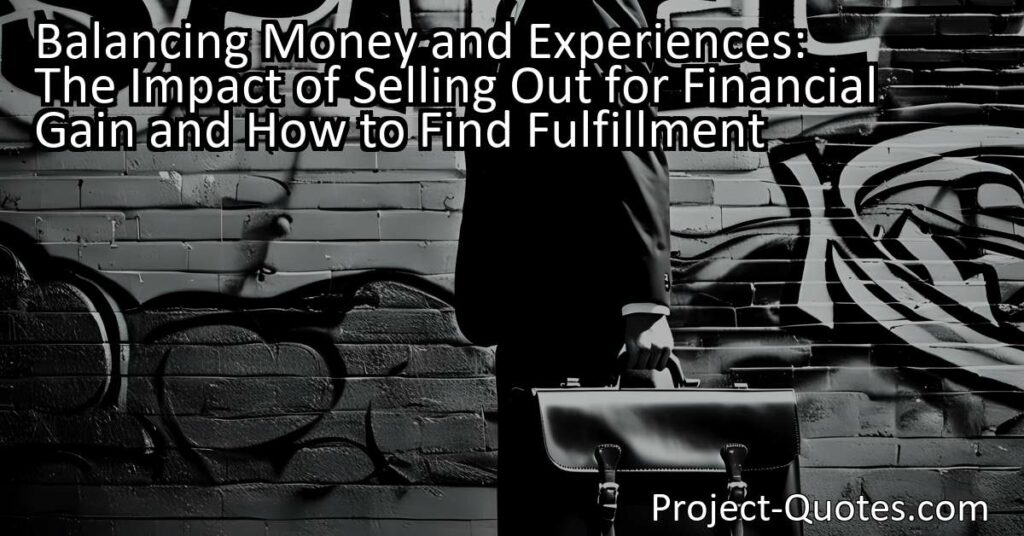Sooner or later, we sell out for money.
Tony Randall
Balancing Money and Experiences: The Impact of Selling Out for Financial Gain and How to Find Fulfillment In this thought-provoking article, we explore the impact of money on our lives and the choices we make. We discuss how society’s obsession with wealth can lead individuals to compromise their values and relationships, but also how finding a balance between financial stability and personal fulfillment is possible. By prioritizing quality time with loved ones and pursuing experiences that bring joy and growth, we can find true fulfillment beyond the pursuit of money.
Table of Contents
Meaning of Quote – Sooner or later, we sell out for money.
Sooner or later, we sell out for money. These words, imparted by the beloved actor Tony Randall, carry a profound message about the choices we make in life. Money, a universal necessity in our modern society, often becomes a driving force behind our actions and decisions. While it may seem disheartening to acknowledge that we may compromise our values for financial gain, delving deeper into this idea allows us to explore the complexities of human nature and the impact of money on our lives.
In a world driven by consumerism and materialism, the pursuit of money takes center stage. We are bombarded with advertisements enticing us to buy the latest gadgets, fashion trends, and luxury items. The media portrays success as synonymous with wealth, fostering a culture where money becomes the ultimate measure of personal achievement and societal worth. Consequently, many individuals find themselves trapped in a relentless pursuit of financial gain, leading them to compromise their principles in the process.
One common way in which people may “sell out” for money is by choosing a career solely based on its monetary rewards rather than their genuine passion or talent. Society places immense value on prestigious, high-paying jobs, often overlooking individuals who pursue unconventional or less lucrative professions. As a result, individuals may find themselves sacrificing their true interests and aspirations to fulfill societal expectations. Whether it be succumbing to the pressures of pursuing a career in law or medicine despite a passion for the arts, or settling for a monotonous job that offers financial security but no personal fulfillment, these choices reflect the impact money can have on our career decisions.
Moreover, the pursuit of money can lead individuals to compromise their moral compass and engage in unethical or even illegal activities. Desperation for financial security or the desire for instant gratification can cloud one’s judgment, pushing them to engage in behaviors they would have once considered unthinkable. The allure of fast money may lead individuals to engage in white-collar crimes, fraud, or take advantage of vulnerable populations. These actions not only endanger others but also erode our own sense of integrity, highlighting the dangers of selling out for monetary gain.
Furthermore, money can drive individuals to prioritize financial success at the expense of their relationships and overall well-being. The demands of a high-stress job that offers substantial financial compensation often lead to long work hours, limited personal time, and increased stress levels. In such cases, individuals find themselves sacrificing meaningful connections with family and friends in pursuit of financial stability or societal recognition. The consequences are far-reaching, as strained relationships and a lack of work-life balance can lead to feelings of isolation, unhappiness, and a diminished sense of overall well-being.
However, it is crucial to acknowledge that the pursuit of money is not inherently negative. Money provides opportunities and a means to live a comfortable life. It allows individuals to provide for their families, access education, and support causes they deeply care about. Recognizing this, we must strike a delicate balance between financial stability and personal values, ensuring that our pursuit of money aligns with our broader life goals.
Finding this balance requires self-reflection and an understanding of our personal values and priorities. It involves questioning whether the choices we make solely prioritize financial gain or if they also foster personal growth, happiness, and the well-being of others. Developing financial literacy is also important, as it equips us with the knowledge and skills necessary to make informed decisions about money, ultimately reducing the likelihood of compromising our values.
Additionally, fostering a mindset that prioritizes experiences and relationships over material possessions can help mitigate the negative impacts of selling out for money. By consciously valuing and investing in experiences that bring joy, personal growth, and connection, individuals can find fulfillment and meaning beyond the pursuit of wealth. These experiences may include spending quality time with loved ones, pursuing hobbies and passions, volunteering for causes they believe in, and embracing simplicity and gratitude in daily life.
Ultimately, the quote by Tony Randall serves as a reminder of the complexities surrounding money and its influence on our lives. While the pursuit of financial stability is necessary, it is important to carefully navigate the potential pitfalls of selling out for money. By consciously evaluating our choices, prioritizing personal values, and seeking fulfillment beyond material possessions, we can maintain our integrity and live a life aligned with our authentic selves. Money should never be the sole measure of our worth or the driving force behind our decisions; instead, it should be a tool to enhance our lives and those around us.
I hope this quote inspired image brings you hope and peace. Share it with someone who needs it today!


